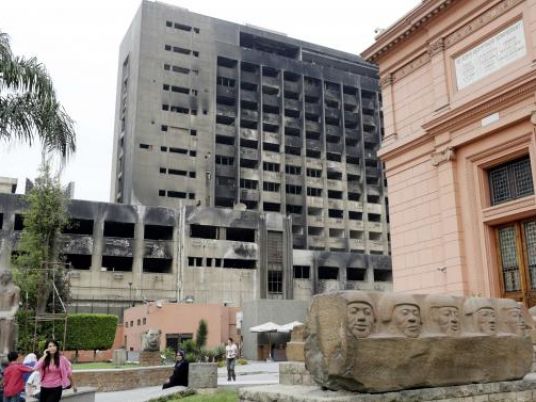Seven hundred and eighty NDP candidates will vie for 508 seats in the impending parliamentary poll, leaving around 40 “open” districts where several party members will compete for the same seat, reports state-run Al-Ahram. This decision has alarmed the candidates and fueled debate among commentators and opposition figures. Analysts are left speculating on the ruling party’s motives.
NDP cadres argue the decision merely reflects the results of the internal elections, and is an attempt to maintain strong candidacies within the party’s ranks. NDP secretary for Cairo Governorate, Gamal al-Said, said the decision reflects equal public support for candidates in certain districts. The move, al-Said added, permits the parliamentary poll to be the final word, reports privately-owned Al-Shorouk.
NDP secretary in Sohag, Nashaat Al-Aris, argued the party’s strategy will allow all strong candidates to run, and will not lead to NDP support base fragmentation, reports Rose Al-Youssef. Rather, this is a strategy that aims to divide opposition votes.
While Wafd Party official spokesperson Mohammed Mostafa Shardi described the strategy as “well-played,” his Muslim Brotherhood counterpart Essam al-Eryan characterized the move as a sign of “chaos” and “lack of discipline,” reports Youm 7. The NDP’s decision will engender internecine competition, increasing the amount of money NDP candidates spend on their campaigns. Opposition parties will, thus, be at a disadvantage, however, due to their relatively meager coffers.
In a page-length discussion of the issue, Youm 7 presents a host of alternative explanations of the decision, including an argument that the NDP aims to secure a greater majority than it won in 2005. Along the same line, another diagnosis posits the move intends to divide opposition votes, reports privately-owned Youm 7. Proponents of this view argue the NDP may allow some Muslim Brotherhood and Wafd party candidates to win in a few districts, including Al-Manakh in Port Said, where Wafd party candidate Mohammed Mostafa Shardi will be on the ballot.
Rationale aside, the decision sent shockwaves throughout several districts. NDP candidates in two “open” districts in Ismailia were “shocked” to hear they would not be the party’s sole candidates, reports state-run flagship Al-Ahram. But, according to Al-Ahram, the decision is the result of careful examination, and aims to ensure NDP victories.
In Minya, 54 NDP candidates will be competing over 22 seats and two women’s quota seats, reports Al-Wafd, published by the liberal Wafd party. Between 2 to 5 NDP candidates will compete over seats in Minya certain districts.
The introduction of multiple NDP nominees per seat has also caused a great deal of uproar among candidates eyeing the party’s traditional symbols, namely the crescent and the camel, reports Al-Wafd. Interestingly, the party obtained six news symbols to accommodate the increase in the number of candidates, reports state-run Rose Al-Youssef. Rumors that “principal” candidates received the party’s traditional symbols and those receiving secondary symbols are “back-ups,” forced NDP’s secretary, Ahmed Ezz, to say all party candidates are, in fact, “principal,” reports state-run Rose Al-Youssef.
In related news, excluded NDP candidates have continued their battle against the NDP leadership. In Assuit, dozens of excluded NDP candidates collectively resigned from the party, according to Al-Shorouk. Imam al-Kirdassi, one of those excluded in Matariya and Ein Shams districts, protested the nomination of Nageh Galal and Mimi Al-Omda, charging the results were pre-determined, reports A-Shorouk. Al-Kirdassi described internal elections as a “game,” saying provocatively he will “ally himself with the devil against the NDP,” if need be.
Al-Kirdassi noted that Galal is not fit to represent the party as there are 40 court rulings against him. In South Sinai, excluded candidates threatened to bring down NDP candidate, reports Al-Shorouk. In Sohag, two NDP female candidates excluded from the quota seat nomination, threatened to hold a protest and collectively resign, arguing that cronyism infected the selection process, according to Al-Shorouk. In the district of Hadaek Kobba, excluded NDP candidates announced they will hold a protest on Tuesday before NDP secretariat headquarters.
Egypt's papers:
Al-Ahram: Daily, state-run, largest distribution in Egypt
Al-Akhbar: Daily, state-run, second to Al-Ahram in institutional size
Al-Gomhorriya: Daily, state-run
Rose al-Youssef: Daily, state-run, close to the National Democratic Party's Policies Secretariat
Al-Dostour: Daily, privately owned
Al-Shorouk: Daily, privately owned
Al-Wafd: Daily, published by the liberal Wafd Party
Al-Arabi: Weekly, published by the Arab Nasserist party
Youm7: Weekly, privately owned
Sawt al-Umma: Weekly, privately owned




